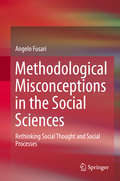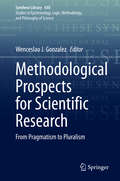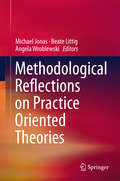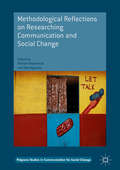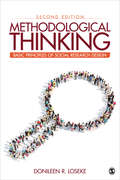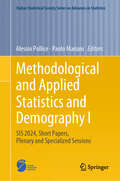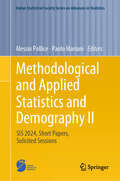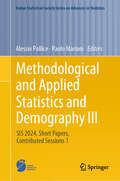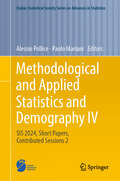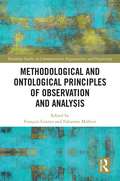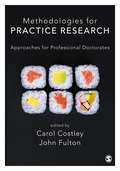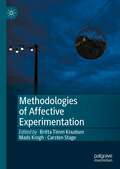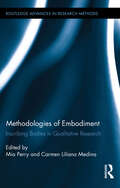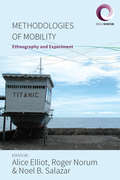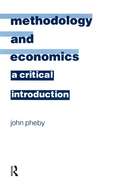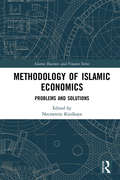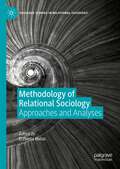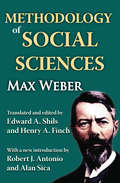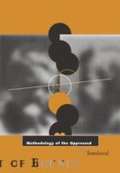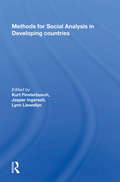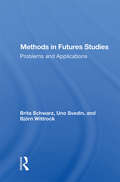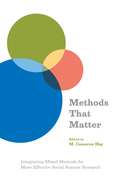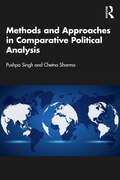- Table View
- List View
Methodological Misconceptions in the Social Sciences
by Angelo FusariThis book offers a systematic view of social analysis that will advance the communication of results between different academic disciplines. It overcomes misunderstandings that are due to the use of an unstructured variety of methodological traditions in the analysis of complex socioeconomic and political processes. The book focuses on the special features of human society: humans as subjects, non-repetitiveness and irreversibility of social actions and the peculiar relations between necessity and possibility in human action. It defines methodological criteria, procedures and rules that enable researchers to select and classify realistic hypotheses to derive general principles and basic organizational features. It then applies these criteria in critical reviews of major theories and interpretations of society and history, offering clarifications and alternative proposals with regard to crucial aspects of anthropological, political, juridical, sociological and religious thought.
Methodological Prospects for Scientific Research: From Pragmatism to Pluralism (Synthese Library #430)
by Wenceslao J. GonzalezThis book highlights the existence of a diversity of methods in science, in general, in groups of sciences (natural, social or the artificial), and in individual sciences. This methodological variety is open to a number of consequences, such as the differences in the research according to levels of reality (micro, meso and macro), which leads to multi-scale modelling and to questioning “fundamental” parts in the sciences, understood as the necessary support for the whole discipline. In addition, this volume acknowledges the need to assess the efficacy of procedures and methods of scientific activity in engendering high quality results in research made; the relevance of contextual factors for methodology of science; the existence of a plurality of stratagems when doing research in empirical sciences (natural, social and of the artificial); and the need for an ethical component while developing scientific methods, because values should have a role in scientific research. The book is of interest to a broad audience of philosophers, academics in various fields, graduate students and research centers interested in methodology of science.
Methodological Reflections on Practice Oriented Theories
by Beate Littig Michael Jonas Angela WroblewskiThis volume presents a comprehensive overview of methodological issues and empirical methods of practice-oriented research. It examines questions regarding the scope and boundaries of practice-oriented approaches and practice theory. It discusses the potential advantages and disadvantages of the diversity resulting from the use of these approaches, as well as method and methodology-related issues. The specific questions explored in this volume are: What consequences are linked to the application of a praxeological perspective in empirical research when it comes to the choice of methods? Is there such a thing as an ideal path to follow in praxeological empirical research? What relationship is there between qualitative and quantitative approaches? What differentiates practice-based social research from other perspectives and approaches such as discourse analysis or hermeneutics? The contributions in this book discuss these questions either from a methodological point of view or from a reflective perspective on empirical research practices.
Methodological Reflections on Researching Communication and Social Change (Palgrave Studies in Communication for Social Change)
by Norbert Wildermuth Teke NgombaThis book identifies the strengths and weaknesses of different methodological approaches to research in communication and social change. It examines the methodological opportunities and challenges occasioned by rapid technological affordances and society-wide transformations. This study provides grounded insights on these issues from a broad range of proficient academics and experienced practitioners. Overall, the different contributions address four key themes: a critical evaluation of different ethnographic approaches in researching communication for/and social change; a critical appraisal of visual methodologies and theatre for development research; a methodological appraisal of different participatory approaches to researching social change; and a critical examination of underlying assumptions of knowledge production within the dominant strands of methodological approaches to researching social change. In addressing these issues through a critical reflection of the methodological decisions and implications of their research projects, the contributors in this book offer perspectives that are highly relevant for students, researchers and practitioners within the broad field of communication for/and social change.
Methodological Thinking: Basic Principles of Social Research Design
by Donileen R. LosekeFocused on the underlying logic behind social research, Methodological Thinking: Basic Principles of Social Research Design by Donileen R. Loseke encourages readers to understand research methods as a way of thinking. The book provides a concise overview of the basic principles of social research, including the characteristics of research questions, the importance of literature reviews, variations in data generation techniques, and sampling. The Second Edition includes a revised chapter on research foundations, with focus on the philosophy of science and ethics; an emphasis on critical thinking; additional attention to evaluating research; and a new selection of briefer, multidisciplinary journal articles designed to be accessible to a wide variety of readers.
Methodological Thinking: Basic Principles of Social Research Design
by Donileen R. LosekeFocused on the underlying logic behind social research, Methodological Thinking: Basic Principles of Social Research Design by Donileen R. Loseke encourages readers to understand research methods as a way of thinking. The book provides a concise overview of the basic principles of social research, including the characteristics of research questions, the importance of literature reviews, variations in data generation techniques, and sampling. The Second Edition includes a revised chapter on research foundations, with focus on the philosophy of science and ethics; an emphasis on critical thinking; additional attention to evaluating research; and a new selection of briefer, multidisciplinary journal articles designed to be accessible to a wide variety of readers.
Methodological and Applied Statistics and Demography I: SIS 2024, Short Papers, Plenary and Specialized Sessions (Italian Statistical Society Series on Advances in Statistics)
by Paolo Mariani Alessio PolliceThis book of peer-reviewed short papers on methodological and applied statistics and demography is the first of four volumes from the 52nd Scientific Meeting of the Italian Statistical Society (SIS 2024), held in Bari, Italy, on June 17-20, 2024. It features invited contributions presented in the Plenary and Specialized Sessions. The volumes address a large number of topics and applications of current interest. The topics covered include, but are not limited to, statistical theory and methods, sampling theory, Bayesian statistics, statistical modeling, computational statistics, classification, data analysis, gender statistics and applied statistics. The applications reflect new analyses in a wide variety of fields, including demography, psychometrics, education, business, economics, finance, law, and other social sciences and humanities, epidemiology, the life and health sciences as well as the environmental and natural sciences and engineering. This variety also demonstrates the important role of statistical science in addressing the societal and environmental challenges of sustainable development. One of the aims of the Italian Statistical Society (SIS) is to promote scientific activities for the development of statistical sciences. Its biennial international Scientific Meeting represents the Society’s largest event which brings together national and international researchers and professionals to exchange ideas and discuss recent advances and developments in theoretical and applied statistics.
Methodological and Applied Statistics and Demography II: SIS 2024, Short Papers, Solicited Sessions (Italian Statistical Society Series on Advances in Statistics)
by Paolo Mariani Alessio PolliceThis book of peer-reviewed short papers on methodological and applied statistics and demography is the second of four volumes from the 52nd Scientific Meeting of the Italian Statistical Society (SIS 2024), held in Bari, Italy, on June 17-20, 2024. It features invited contributions presented in the Solicited Sessions. The volumes address a large number of topics and applications of current interest. The topics covered include, but are not limited to, statistical theory and methods, sampling theory, Bayesian statistics, statistical modeling, computational statistics, classification, data analysis, gender statistics and applied statistics. The applications reflect new analyses in a wide variety of fields, including demography, psychometrics, education, business, economics, finance, law, and other social sciences and humanities, epidemiology, the life and health sciences as well as the environmental and natural sciences and engineering. This variety also demonstrates the important role of statistical science in addressing the societal and environmental challenges of sustainable development. One of the aims of the Italian Statistical Society (SIS) is to promote scientific activities for the development of statistical sciences. Its biennial international Scientific Meeting represents the Society’s largest event which brings together national and international researchers and professionals to exchange ideas and discuss recent advances and developments in theoretical and applied statistics.
Methodological and Applied Statistics and Demography III: SIS 2024, Short Papers, Contributed Sessions 1 (Italian Statistical Society Series on Advances in Statistics)
by Paolo Mariani Alessio PolliceThis book of peer-reviewed short papers on methodological and applied statistics and demography is the third of four volumes from the 52nd Scientific Meeting of the Italian Statistical Society (SIS 2024), held in Bari, Italy, on June 17-20, 2024. It features the first part of the contributions presented in the Contributed Sessions. The volumes address a large number of topics and applications of current interest. The topics covered include, but are not limited to, statistical theory and methods, sampling theory, Bayesian statistics, statistical modeling, computational statistics, classification, data analysis, gender statistics and applied statistics. The applications reflect new analyses in a wide variety of fields, including demography, psychometrics, education, business, economics, finance, law, and other social sciences and humanities, epidemiology, the life and health sciences as well as the environmental and natural sciences and engineering. This variety also demonstrates the important role of statistical science in addressing the societal and environmental challenges of sustainable development. One of the aims of the Italian Statistical Society (SIS) is to promote scientific activities for the development of statistical sciences. Its biennial international Scientific Meeting represents the Society’s largest event which brings together national and international researchers and professionals to exchange ideas and discuss recent advances and developments in theoretical and applied statistics.
Methodological and Applied Statistics and Demography IV: SIS 2024, Short Papers, Contributed Sessions 2 (Italian Statistical Society Series on Advances in Statistics)
by Paolo Mariani Alessio PolliceThis book of peer-reviewed short papers on methodological and applied statistics and demography is the fourth of four volumes from the 52nd Scientific Meeting of the Italian Statistical Society (SIS 2024), held in Bari, Italy, on June 17-20, 2024. It features the second part of the contributions presented in the Contributed Sessions. The volumes address a large number of topics and applications of current interest. The topics covered include, but are not limited to, statistical theory and methods, sampling theory, Bayesian statistics, statistical modeling, computational statistics, classification, data analysis, gender statistics and applied statistics. The applications reflect new analyses in a wide variety of fields, including demography, psychometrics, education, business, economics, finance, law, and other social sciences and humanities, epidemiology, the life and health sciences as well as the environmental and natural sciences and engineering. This variety also demonstrates the important role of statistical science in addressing the societal and environmental challenges of sustainable development. One of the aims of the Italian Statistical Society (SIS) is to promote scientific activities for the development of statistical sciences. Its biennial international Scientific Meeting represents the Society’s largest event which brings together national and international researchers and professionals to exchange ideas and discuss recent advances and developments in theoretical and applied statistics.
Methodological and Ontological Principles of Observation and Analysis: Following and Analyzing Things and Beings in Our Everyday World (Routledge Studies in Communication, Organization, and Organizing)
by François Cooren Fabienne MalboisIn our daily experiences, we feel, perceive, designate, invoke or comment on a plurality of beings: people, artifacts, technologies, institutions, projects, animals, divinities, emotions, cultures, ideologies or opinions that are part of our world. While these beings are all part of our world, they present various forms of existence. Echoing recent developments in existential anthropology, Communication as Constitutive of Organization (CCO) research, and Actor Network Theory, here scholars from a variety of disciplines discuss how they study the types of beings that have been at the core of their respective research. Reflecting on the specific mode of existence, presence and action of the being they follow, they reveal the methodological innovations they deploy in order to analyze excerpts of field notes, filmed interactions, conversations, pictures, newspapers, narratives, etc.
Methodologies for Practice Research: Approaches for Professional Doctorates
by John Fulton Carol CostleyOrder your digital inspection copy here. Sharp and focused, this book provides the need-to-know information on how to design and implement a good, high quality research project. Oriented around real-world application, it emphasizes the aspects of research most relevant to conducting practice-based research. Assuming no prior knowledge, but appropriate for experienced learners, it builds knowledge at a sustainable pace. It offers readers: - A no frills guide to methodology and the theory of conducting research - Strategies for communicating complex ideas - Insight into common impact-driven methods like action research, case study, and mixed methods - Ways to develop systematic research projects within the boundaries of everyday working life - Ample opportunities to test and apply newfound knowledge. With streamlined advice tailored specifically to support research in professional contexts, this book is the essential toolkit every researcher who is embarking on a practice-led project needs.
Methodologies for Practice Research: Approaches for Professional Doctorates
by John Fulton Professor Carol CostleySharp and focused, this book provides the need-to-know information on how to design and implement a good, high quality research project. Oriented around real-world application, it emphasizes the aspects of research most relevant to conducting practice-based research. Assuming no prior knowledge, but appropriate for experienced learners, it builds knowledge at a sustainable pace. It offers readers: - A no frills guide to methodology and the theory of conducting research - Strategies for communicating complex ideas - Insight into common impact-driven methods like action research, case study, and mixed methods - Ways to develop systematic research projects within the boundaries of everyday working life - Ample opportunities to test and apply newfound knowledge. With streamlined advice tailored specifically to support research in professional contexts, this book is the essential toolkit every researcher who is embarking on a practice-led project needs.
Methodologies of Affective Experimentation
by Britta Timm Knudsen Carsten Stage Mads KroghWe live in an era of experimentation – both if we look at the broader social world of politics, media and art and at the narrower context of academic knowledge production. This collection consists of 14 chapters by leading scholars in affect studies. They explore the affective dimensions of experimental practices related to, for example, activism, the COVID-19 pandemic, populism, sustainability, patient communities, music streaming, Jamaican dancehall, gangs, leadership, tourism and minority youth cultures. Experiments are understood as intentionally crafted milieus aimed at (re)presenting unnoticed aspects of the world, as non-linear processes with unpredictable outcomes, and as ways of giving the future a provisional form. The collection responds to a pressing need to understand the intersection between affect, experimentation and sociocultural change by offering empirical strategies to explore how, and with what consequences, experimentation is affective.
Methodologies of Embodiment: Inscribing Bodies in Qualitative Research (Routledge Advances in Research Methods)
by Mia Perry Carmen Liliana MedinaThis volume is dedicated to exploring and exposing the challenges, the possibilities, and the processes of empirical work in embodiment. Grounded in qualitative inquiry in the humanities and social sciences, the chapters describe perspectives and contexts of embodied research, but focus on the methodologies, methods, and analytic frames taken up to grapple with this ever-more theorised aspect of qualitative inquiry. The authors drawn together in this volume share an investment in the ways in which the body inscribes and is inscribed within research that foregrounds the cultural, social, affective, and political discourses that are at the core of how bodies act and are acted upon.
Methodologies of Mobility: Ethnography and Experiment (Worlds in Motion #2)
by Noel B. Salazar Alice Elliot Roger NorumResearch into mobility is an exciting challenge for the social sciences that raises novel social, cultural, spatial and ethical questions. At the heart of these empirical and theoretical complexities lies the question of methodology: how can we best capture and understand a planet in flux? Methodologies of Mobility speaks beyond disciplinary boundaries to the methodological challenges and possibilities of engaging with a world on the move. With scholars continuing to face different forms and scales of mobility, this volume strategically traces innovative ways of designing, applying and reflecting on both established and cutting-edge methodologies of mobility.
Methodology and Economics: A Critical Introduction
by John PhebyThe essays in this collection detail the fate of gypsies in the countries of Eastern Europe through the socialist era, and pay special attention to the experience of the Nazi holocaust. The volume includes essays on Czechoslovakia, Yugoslavia, Albania, Hungary and Romania.
Methodology of Islamic Economics: Problems and Solutions (Islamic Business and Finance Series)
by Necmettin KizilkayaIn its pursuit to equip the reader with a basic knowledge of Islamic economics, this book divulges the micro-foundations of the discipline, and highlights the predominant schools of thought that exist in the field. It explains, in simple terms, what Islamic economics entails and how it can be studied as a science in relation to the Holy Quran, the Sunnah and the Islamic intellectual tradition based on these two sources. The book familiarizes the reader with knowledge of the basic maxims of the discipline. It then establishes the arguments that are presented by the proponents of religion-based economics, specifically Islam, and apprises readers about the aforementioned schools as they exist. A number of chapters consider the dimension of the dilemmas the discipline is facing, and the chronological progress of the field is reviewed, hence providing a comprehensive overview of the topic. The book deals with the issues about the origins of Islamic economics, the basic methodological questions, the use of the opportunities offered by fiqh in the methodological discussions and the main problems arising from the encounter with other cultures and civilizations. It offers practical solutions, despite the differing schools of thought, not unlike the development of conventional Economics where radical differences between Keynesian, Classical and Monetarist approaches existed. It concludes by incorporating some of the finest works that explain to the reader how Islamic economics may progress as a discipline. This guide will provide both students and researchers in Comparative Economic Studies, Islamic Economics and Islamic Finance with an essential overview of the field.
Methodology of Relational Sociology: Approaches and Analyses (Palgrave Studies in Relational Sociology)
by Elżbieta HałasThis is the first book addressing explicitly and specifically the methodological issues of relational sociology, and more broadly of the new relational paradigm in social sciences. The dynamically developing relational movement in social and cultural sciences is fueled by various classical and contemporary theoretical inspirations. Relational approaches propose various models of relational analyses, such as field analysis, social space analysis, network analysis, or the critical realist relational heuristic. The relational turn, which promotes interdisciplinarity in research, simultaneously reflects the drive towards an innovative reconstruction of sociology. Contemporary relational sociology is at the forefront of the relational movement. The program of relational sociology is still being shaped, frequently becoming the subject of discussions with different standpoints expressed. The aim of this book is to reflect on various relational approaches and models of relational analysis. Answers to two basic questions are sought: Are there foundations for a methodological unity of relational sociology, despite the diversity of approaches? And does relational sociology form a new paradigm? To answer these questions, it is necessary to investigate differences between the relational paradigm and the earlier, competing sociological paradigms. The answers to key questions show what innovations the methodology of relational sociology brings, i.e. what are the methodological consequences of the relational concept of the social fact. The broadly defined horizon of methodological issues is presented. The book creates an open space for discussion on various approaches and varieties of relational analysis, as well as the possibility of their methodological synthesis within relational sociology.
Methodology of Social Sciences: Max Weber
by Max WeberMax Weber wrote these methodological essays in the closest intimacy with actual research and against a background of constant and intensive meditation on substantive problems in the theory and strategy of the social sciences. They were written between 1903 and 1917, the most productive of Max Weber's life, when he was working on his studies in the sociology of religion and Wirtschaft und Gesellschaft.Weber had done important work in economic and legal history and had taught economic theory. On the basis of original investigations, he had acquired a specialist's knowledge of the details of German economic and social structure. His always vital concern for the political prosperity of Germany among the nations thrust him deeply into discussion of political ideals and programs.Weber's methodology still holds interest for us. Some of its shortcomings, from the contemporary viewpoint, may be attributed to the fact that some of the methodological problems that he treated could not be satisfactorily resolved prior to certain actual developments in research technique. These few qualifications aside, the work remains a pioneering work in large scale social research, from one of the field's masters.
Methodology of the Oppressed
by Chela SandovalIn a work with far-reaching implications, Chela Sandoval does no less than revise the genealogy of theory over the past thirty years, inserting what she terms "U.S. Third World feminism" into the narrative in a way that thoroughly alters our perspective on contemporary culture and subjectivity. What Sandoval has identified is a language, a rhetoric of resistance to postmodern cultural conditions. U.S liberation movements of the post-World War II era generated specific modes of oppositional consciousness. Out of these emerged a new activity of consciousness and language Sandoval calls the "methodology of the oppressed". This methodology -- born of the strains of the cultural and identity struggles that currently mark global exchange -- holds out the possibility of a new historical moment, a new citizen-subject, and a new form of alliance consciousness and politics. Utilizing semiotics and U.S. Third World feminist criticism, Sandoval demonstrates how this methodology mobilizes love as a category of critical analysis. Rendering this approach in all its specifics, Methodology of the Oppressed gives rise to an alternative mode of criticism opening new perspectives on a theoretical, literary, aesthetic, social movement, or psychic expression.
Methods For Social Analysis In Developing Countries
by Kurt Finsterbusch Jasper Ingersoll Lynn LlewellynThis book fills the gap between social science methodology books and the realities of conducting social research under Third World conditions. It focuses on social impact assessment methods and cost effective social analyses for development projects and programs in US and Third World countries.
Methods In Futures Studies: Problems And Applications
by Brita SchwarzThis book presents three examples of futures research that illustrate the problems of applying knowledge during the course of a futures research project, the ways in which different methodologies interact, and various means of combining and adapting methodological tools and techniques.
Methods That Matter: Integrating Mixed Methods for More Effective Social Science Research
by M. Cameron HayTo do research that really makes a difference--the authors of this book argue--social scientists need questions and methods that reflect the complexity of the world. Bringing together a consortium of voices across a variety of fields, Methods that Matter offers compelling and successful examples of mixed methods research that do just that. In case after case, the researchers here break out of the traditional methodological silos that have long separated social science disciplines in order to better describe the intricacies of our personal and social worlds. Historically, the largest division between social science methods has been that between quantitative and qualitative measures. For people trained in psychology or sociology, the bias has been toward the former, using surveys and experiments that yield readily comparable numerical results. For people trained in anthropology, it has been toward the latter, using ethnographic observations and interviews that offer richer nuances of meaning but are difficult to compare across societies. Discussing their own endeavors to combine the quantitative with the qualitative, the authors invite readers into a conversation about the best designs and practices of mixed methodologies to stimulate creative ideas and find new pathways of insight. The result is an engaging exploration of a promising new approach to the social sciences.
Methods and Approaches in Comparative Political Analysis
by Pushpa Singh Chetna SharmaThis book focuses on the methods and approaches in comparative politics while tracing the evolution of the discipline. Exploring its historical legacy through a comparative perspective, it uses research methods and methodologies to critically analyse the approaches used in the book.This unique volume provides an exclusive reading on the dimension of gender in comparative politics. It also investigates the foundational approaches and insights from the perspective of postcolonial societies and diverse regions of the world.Lucidly written to serve a diversity of readership, this book is an invaluable resource for students, researchers, and teachers from the departments of political science, public administration, history, and journalism. Owing to its detailed, diverse, and rich discussions on the different aspects of these themes, it will be equally useful to researchers in the field of gender studies and comparative politics.
